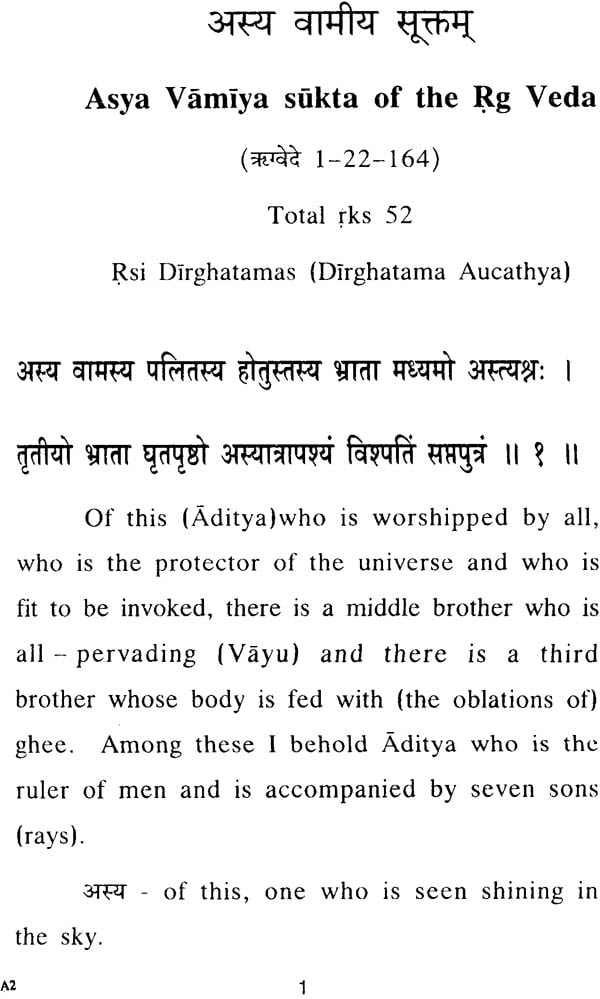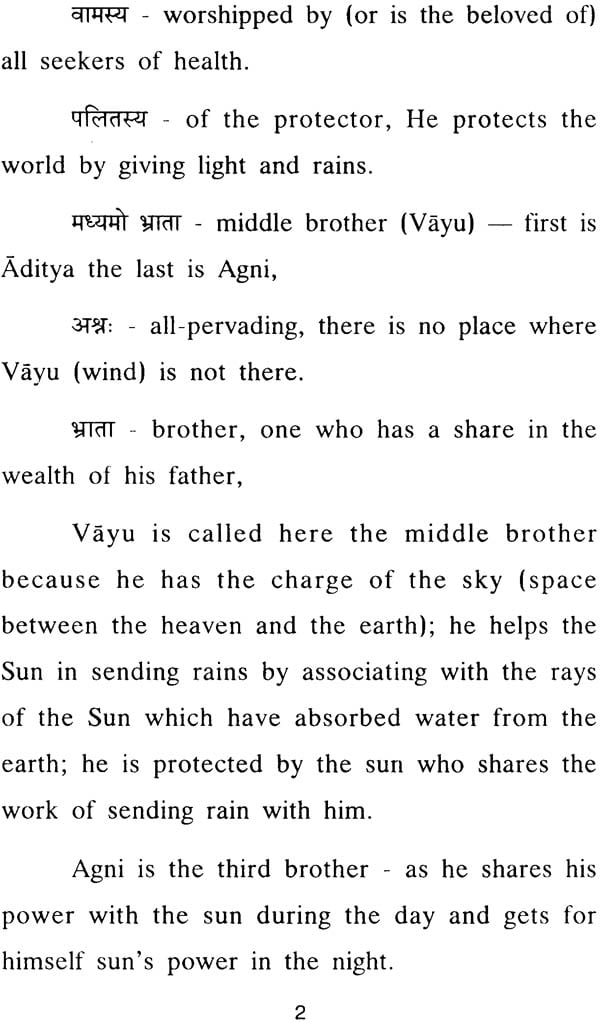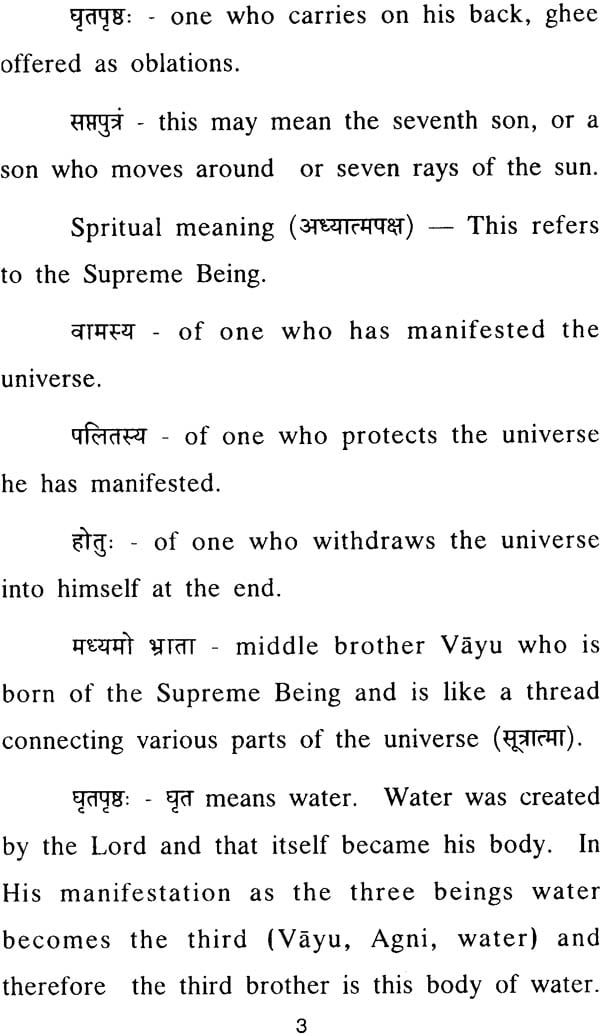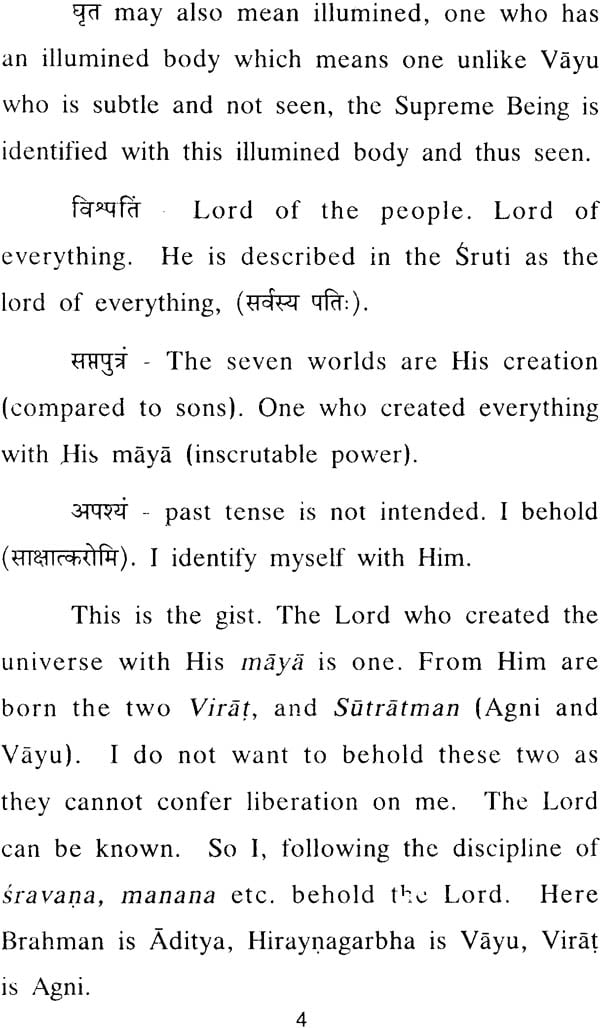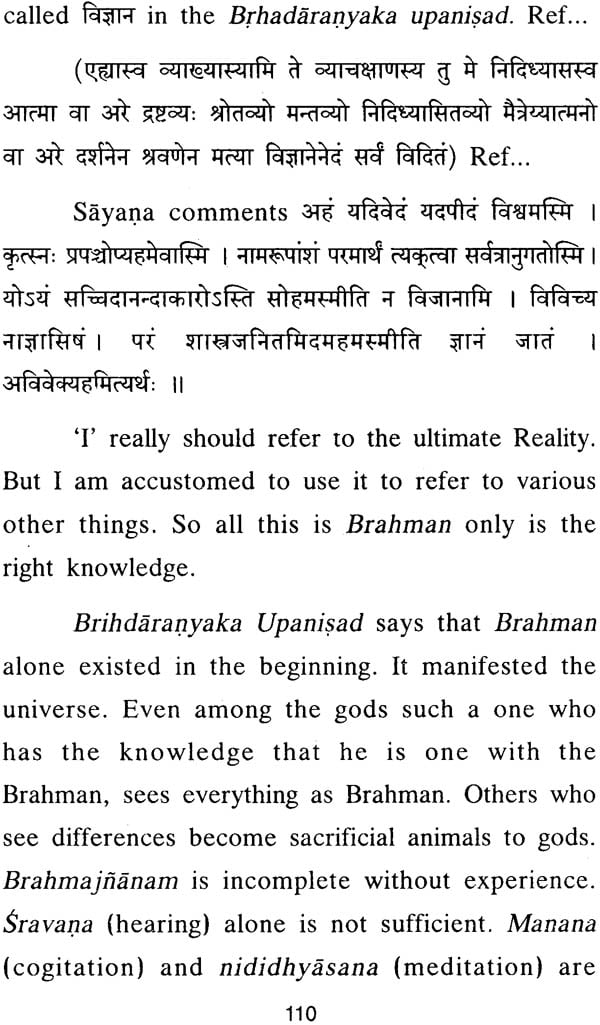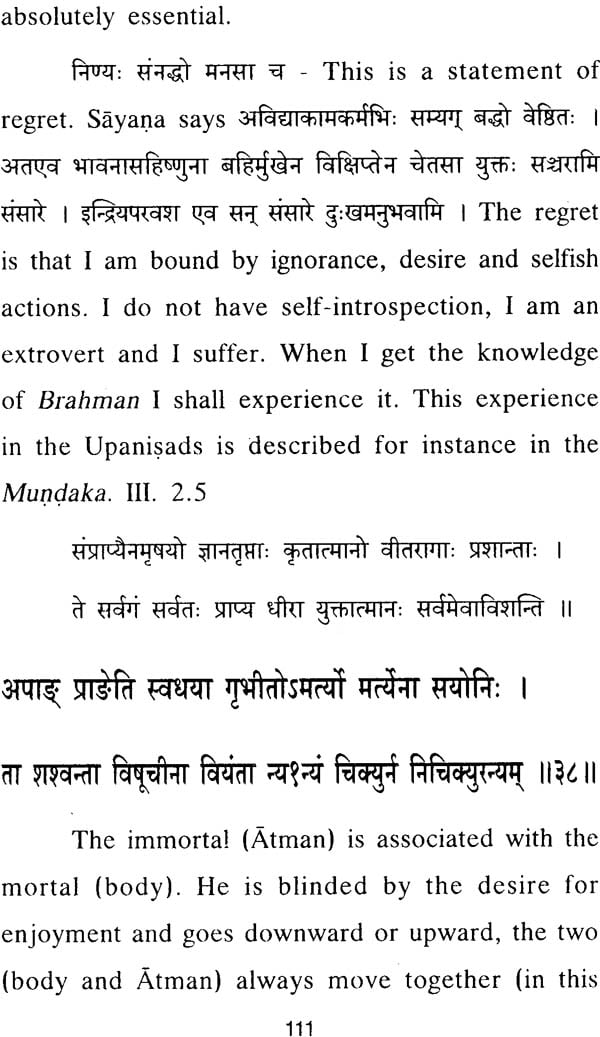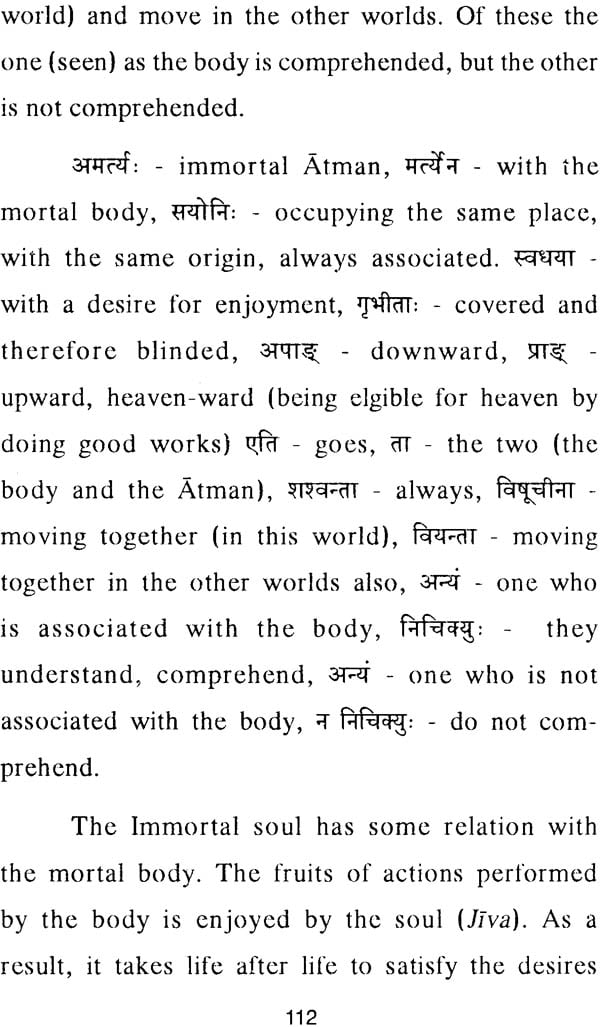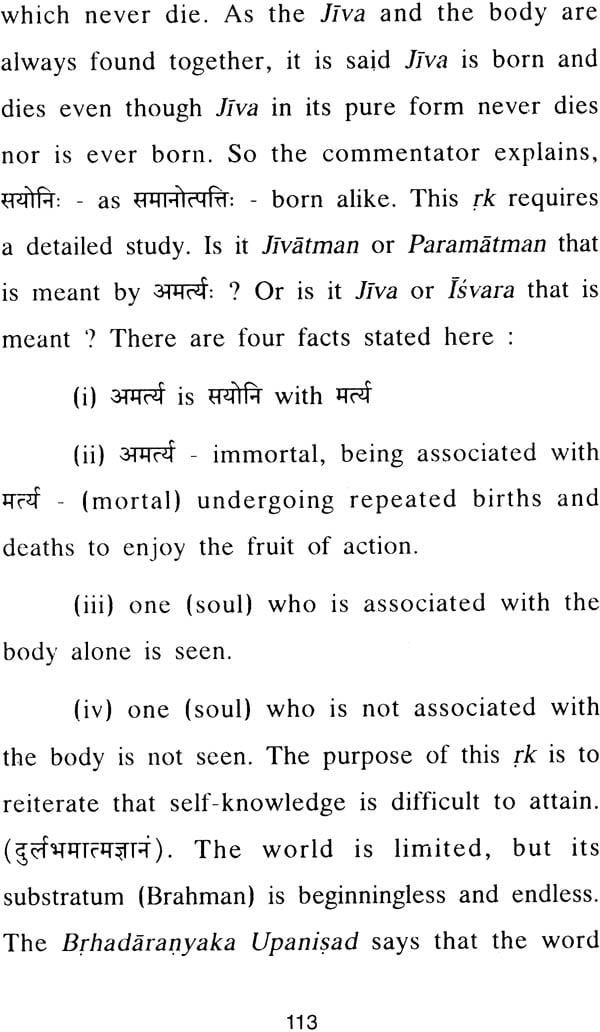
Rg Vedic Suktas Asya Vamiya Suktam
Book Specification
| Item Code: | IDG391 |
| Author: | Swami Amritananda |
| Publisher: | Sri Ramakrishna Math |
| Language: | English |
| Edition: | 2003 |
| ISBN: | 9788171208616 |
| Pages: | 175 |
| Cover: | Paperback |
| Other Details | 8.5" X 5.5" |
| Weight | 200 gm |
Book Description
Publishers' Note:
We have great pleasure in placing before our readers this minutely researched edition of Asya Vamiya Suktas of the Rg. Veda.
Suktas are hymns in praise of diverse deities in the Vedic pantheon. But they are not mere finely crafted literary pieces. They have a double import viz. pragmatic and transcendental. Each Mantra passionately invokes a particular deity of whom favours are sought. This, however, is only a fringe benefit. The profounder gain for the aspirant is the deep insight he gets into the path that leads to the Goal Supreme. Abhyudaya, the material prosperity that the Mantra promises, is but a stepping stone to Nihsreyasa, supreme fulfilment-' obtaining which one is not affected by any sorrow that the world considers grave', as the Gita puts it.
This double-edged play of the Mantras naturally attracts the plentiful use of symbolism. The Nirukta, which offers glossarial explanation of Vedic words, has to be pressed into service to understand the sublime imagery projected by the Mantras. For example, what is 'sun' in plain Sanskrit it has to be inferred as 'cow', 'cloud', 'earth', 'rain', etc. according to the context! In order that one may not miss the wood for the trees the guidance of a safe commentator has to be sought. And none fits the bill better than Sayana, the polymath. Swami Amritanandaji has done well in relying throughout in Sayana in extricating the meaning of the challenging passages.
He gives the text and the meaning in English of each Rk, (mantra), followed by word-by-word explanation of the terms used in the Rk. He cites chapter and verse from other scriptural texts like the Upanishads and the Bhagavad Gita to pin point the fact that 'all the jackals how! Alike', as Sri Ramakrishna picturesquely puts it. All the texts of our Santana Dharma say the same thing in essence. It is noteworthy that it is in this Sukta that we meet that famous oft-quoted declaration 'Ekam Sat, viprah bahudha vadanti' - Truth is one, the sages speak of it variously. That this is not just a poetic hyperbole has been scientifically demonstrated by Sri Ramakrishna who scrupulously practised all the different paths to the infinite and could declare with unshakable certainty that all faiths sincerely pursued lead to the same Eternal Truth.
Asya Vamiya Sukta is a challenge and an inspiration. The enormous trouble taken by Swami Amritananda in presenting this reader-friendly exposition of the Sukta will be rewarded if the reader, on going through it, feels attuned to the higher values of life.
We are thankful to Shri P. Haridas, Secretary, M. O. P. Vaishnav College for Women, Chennai, whose subsidy has brought down the cost of the book so as to reach a large section of the society.
The Vedas are our ancient scriptures. The word Veda means knowledge and the Vedas convey to us the knowledge of many things. They are particularly important for they convey supersensual truths which are beyond the ken of the five senses.
According to Sayana the Vedahood of the Vedas consists in conveying to us the knowledge of the supersensual which cannot be got from the ordinary methods of perception and inference. There arc four divisions in each of the Vedas viz. Samhitas (collection of mantras), Br ahmauas (application of mantras in rituals), Aranyakas (philosophical questions raised by persons who retired to forests to meditate) and Upanisads (the conclusions reached after deliberation). The Vedas do not present strictly an evolution of ideas, but a gradation according to the different grades of men to suit their power of understanding.
According to Swami Vivekananda, the Vedas contain the history of the progress of religious consciousness until religion has reached perfection in unity. He further says, that the Vedas are the only scriptures which teach the idea of the Absolute god of which all other ideas of god are but limited versions. The Veda, as the well- wisher, takes its votary gently by the hand and leads him through various stages to the Absolute. All other religions represent one or other of these stages in crystallized forms. In this sense we may say all other religions are included in the nameless, limitless, eternal Vedic religion. He further says that the Vedas, being the first, the most complete and the most undistorted collection of spiritual truths, deserve to occupy the highest place among all scriptures, command the respect of all nations and furnish the rationale of all their respective scriptures.
The Vedic testimony is the only means of knowing supersensuous truths. It does not contradict other means of knowledge. But the reality is not exhausted by the other means. The other means at best can convey the knowledge of conditional reality. The Vedas are the only means to the knowledge of non-dual Brahman. The ultimate Reality is the non-dual Brahman taught by the Upanisads. Even reason, independent of the Sruti, cannot reveal it. Attaining to this reality means liberation.
The Vedic testimony precedes intuitive perception of supersensuous truths. According to Sayanacarya, the great Vedic commentator, the Vedas are authentic, only because they disclose truths beyond one's experience. Sankaracarya says that the scripture is the only source of knowledge of the truths beyond the sensible world.
Facts of the super sensible world are : God, soul, their relation, soul's journey after death, heaven, hell, the origin of the universe, merit and demerit accruing from righteous and unrighteous deeds, their fructification, man's highest destiny and its fulfillment. These are beyond the narrow field of reason. But the knowledge of the above facts is very important to us. According to Swami Vivekananda human life will be purposeless without a proper knowledge of them. All our ethical theories, have been moulded upon the knowledge of the above facts that have been given to us by Vedic testimony.
